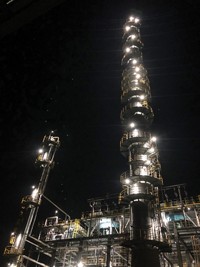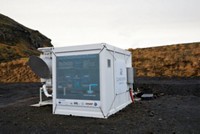Advertisement
Grab your lab coat. Let's get started
Welcome!
Welcome!
Create an account below to get 6 C&EN articles per month, receive newsletters and more - all free.
It seems this is your first time logging in online. Please enter the following information to continue.
As an ACS member you automatically get access to this site. All we need is few more details to create your reading experience.
Not you? Sign in with a different account.
Not you? Sign in with a different account.
ERROR 1
ERROR 1
ERROR 2
ERROR 2
ERROR 2
ERROR 2
ERROR 2
Password and Confirm password must match.
If you have an ACS member number, please enter it here so we can link this account to your membership. (optional)
ERROR 2
ACS values your privacy. By submitting your information, you are gaining access to C&EN and subscribing to our weekly newsletter. We use the information you provide to make your reading experience better, and we will never sell your data to third party members.
Environment
Iceland's Move To Renewable Energy
October 16, 2006
| A version of this story appeared in
Volume 84, Issue 42

One Nation's Story
At the Climate Institute's Washington, D.C., conference, Iceland President Ólafur Ragnar Grímsson described how his country moved from a coal-based economy to one that uses renewable energy for all electricity and nearly all heating. Only transportation still depends on fossil fuels. In total, 70% of Iceland's energy comes from hydroelectric and geothermal sources, Grímsson said.
Fifty years ago, when Grímsson was growing up, the capital, Reykjavik, "was daily covered by black smoke from coal fires," he said. Its harbor was dominated by a coal terminal and clogged with coal-bearing ships from England. Now, Reykjavik's skies are usually clear. Although Iceland is for the most part barren and uninhabitable, it transformed itself from one of the poorest countries in Europe to a nation with high per capita income, housing subsidies, and free health care and education.
Iceland made this transformation in less than half a century, in part through the cooperation of scientists and politicians, Grímsson said. He listed seven areas the country has focused on.
The largest of them is geothermal energy, which today runs power stations and supplies heat for large buildings and 90% of individual homes. Studies are under way for construction of an Alcoa-run aluminum smelter that would use geothermal power.
Iceland's second focus is hydroelectric dams, which provide 18% of the nation's electricity. A dam will power a huge aluminum smelter Alcoa is building on the east coast of Iceland. It is the first primary aluminum facility Alcoa has built anywhere in the world in 20 years and is scheduled to begin production next year.
The third area is hydrogen fuel cells, which run buses and some private cars. Iceland plans to power all of its vehicles, as well as its fishing fleet, with hydrogen produced with geothermal or hydropower by 2050.
A fourth area of emphasis is carbon sequestration. Iceland is experimenting with removing carbon dioxide from air and pumping it into underground basalt formations.
Fifth, Iceland is participating in the international debate on climate change, Grímsson said. It led nations that have territory in the Arctic in producing a report on the effects of climate change on northern regions.
Financial investments constitute the sixth area of emphasis. "Iceland's banks are interested in contributing to climate solutions, not only in Iceland, but in other countries," Grímsson observed. "They have concluded that clean energy is good business."
Finally, Grímsson said, "Iceland is creating partnerships with other countries and states–China, India, and California–for using geothermal and other forms of clean energy.
"Iceland is probably the scariest place to be if climate change continues," Grímsson warned. If too much glacial meltwater pours into the North Atlantic and shuts down the thermohaline circulation in the ocean, the country could be plunged into deep cold for centuries, and "there would be little Icelanders could do except build igloos," he said.
Grímsson, however, is optimistic the rest of the world can move away from fossil fuels in a relatively short time; his optimism is fueled by the large changes already made in Iceland.
MORE ON THIS STORY
- Climate-Change Debate Shifts
- Businesses and governments discuss top-down, bottom-up approaches to averting irreversible dangerous changes
- ONE NATION'S STORY
- Iceland's Move To Renewable Energy





Join the conversation
Contact the reporter
Submit a Letter to the Editor for publication
Engage with us on Twitter